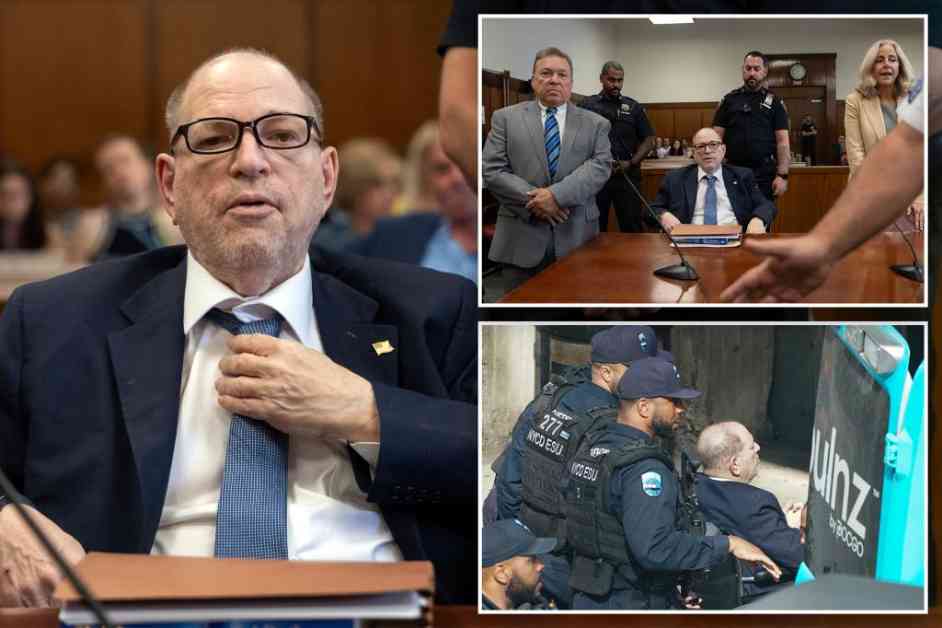Harvey Weinstein Faces New Sex Crimes Charges in Manhattan Arraignment
Harvey Weinstein, the disgraced former movie mogul, is set to face new sex crimes charges in an arraignment scheduled for Wednesday in Manhattan. According to his lawyer, Arthur Aidala, Weinstein will appear in court in person to confront up to three additional sex offenses outlined in a recent indictment. This legal development comes after Weinstein missed a hearing last week due to emergency heart surgery.
The Manhattan District Attorney’s office revealed during the September 12 hearing that a grand jury had issued a new indictment, adding previously uncharged offenses to Weinstein’s legal troubles. The specifics of the indictment remain sealed until Weinstein’s arraignment. However, prosecutors have disclosed that the grand jury heard evidence of alleged assaults dating back to the mid-2000s at the Tribeca Grand Hotel (now the Roxy Hotel), a Lower Manhattan residential building, and in May 2016 at a Tribeca hotel.
Weinstein, who is currently serving time in jail, is also awaiting a retrial in his high-profile #MeToo case. Earlier this year, New York’s highest court overturned his 2020 conviction, leading to the retrial scheduled to commence on November 12. Prosecutors intend to incorporate the new charges into the retrial, although Weinstein’s defense team opposes this, arguing that they should be handled as a separate case.
Aidala expressed uncertainty about the specifics of the new charges, given that the indictment remains sealed. He stated outside the court last week, “We don’t know anything. We don’t know what the exact accusations are, the exact locations are, what the timing is.” Weinstein has consistently maintained that any sexual encounters were consensual.
The Miramax co-founder’s legal saga has been further complicated by health issues. Weinstein underwent emergency surgery on September 9 to address fluid buildup around his heart and lungs. Following the procedure, he was transferred to Bellevue Hospital for treatment. Despite the judge’s ruling to allow him to remain in the hospital’s prison ward rather than being transferred back to Rikers Island jail, Weinstein, 72, continues to face legal and health challenges.
In April, New York’s Court of Appeals overturned Weinstein’s conviction, citing unfair testimony against him based on allegations from other women not directly related to the case. Once a powerful figure in Hollywood, Weinstein co-founded Miramax and The Weinstein Company, producing acclaimed films like “Shakespeare in Love” and “The Crying Game.”
Weinstein’s Legal Battle Continues
As Harvey Weinstein prepares for his upcoming arraignment, the latest development in a series of legal battles, his case has once again drawn attention to the complexities of prosecuting high-profile individuals accused of sexual misconduct. The addition of new charges and the impending retrial highlight the ongoing efforts to hold Weinstein accountable for his alleged actions.
Weinstein’s defense team’s objections to merging the new charges with the retrial underscore the legal maneuvering that often accompanies such high-profile cases. The decision to treat the new charges separately may have significant implications for the outcome of the legal proceedings and the public perception of Weinstein’s guilt or innocence.
The sealed nature of the indictment raises questions about the specific details of the additional charges and how they will impact the overall case against Weinstein. The lack of transparency surrounding the new allegations adds a layer of uncertainty to an already complex legal situation, leaving both the prosecution and defense in a state of anticipation and speculation.
The Impact of #MeToo and Weinstein’s Legacy
Harvey Weinstein’s legal troubles have been inextricably linked to the #MeToo movement, which sparked a global reckoning with sexual harassment and abuse in various industries, including Hollywood. Weinstein’s downfall, once a powerful figure in the entertainment industry, symbolizes the shift in societal attitudes towards holding individuals accountable for their actions, regardless of their status or influence.
The retrial of Weinstein and the addition of new charges serve as a reminder of the lasting impact of the #MeToo movement on the legal landscape and cultural consciousness. The continued pursuit of justice in Weinstein’s case reflects a broader commitment to addressing systemic issues of abuse and exploitation, challenging traditional power dynamics, and advocating for survivors of sexual violence.
Weinstein’s legacy, tarnished by allegations of sexual misconduct and abuse, stands as a cautionary tale of the consequences of unchecked power and privilege. The legal proceedings against him serve as a test of the justice system’s ability to hold individuals accountable for their actions, even in the face of formidable legal challenges and public scrutiny.
In conclusion, Harvey Weinstein’s upcoming arraignment and retrial mark the latest chapter in a saga that has captivated the public’s attention and sparked important conversations about accountability, justice, and the impact of the #MeToo movement. As the legal proceedings unfold, the world will be watching closely to see how the case against Weinstein evolves and what it signifies for the future of holding powerful individuals accountable for their actions.
